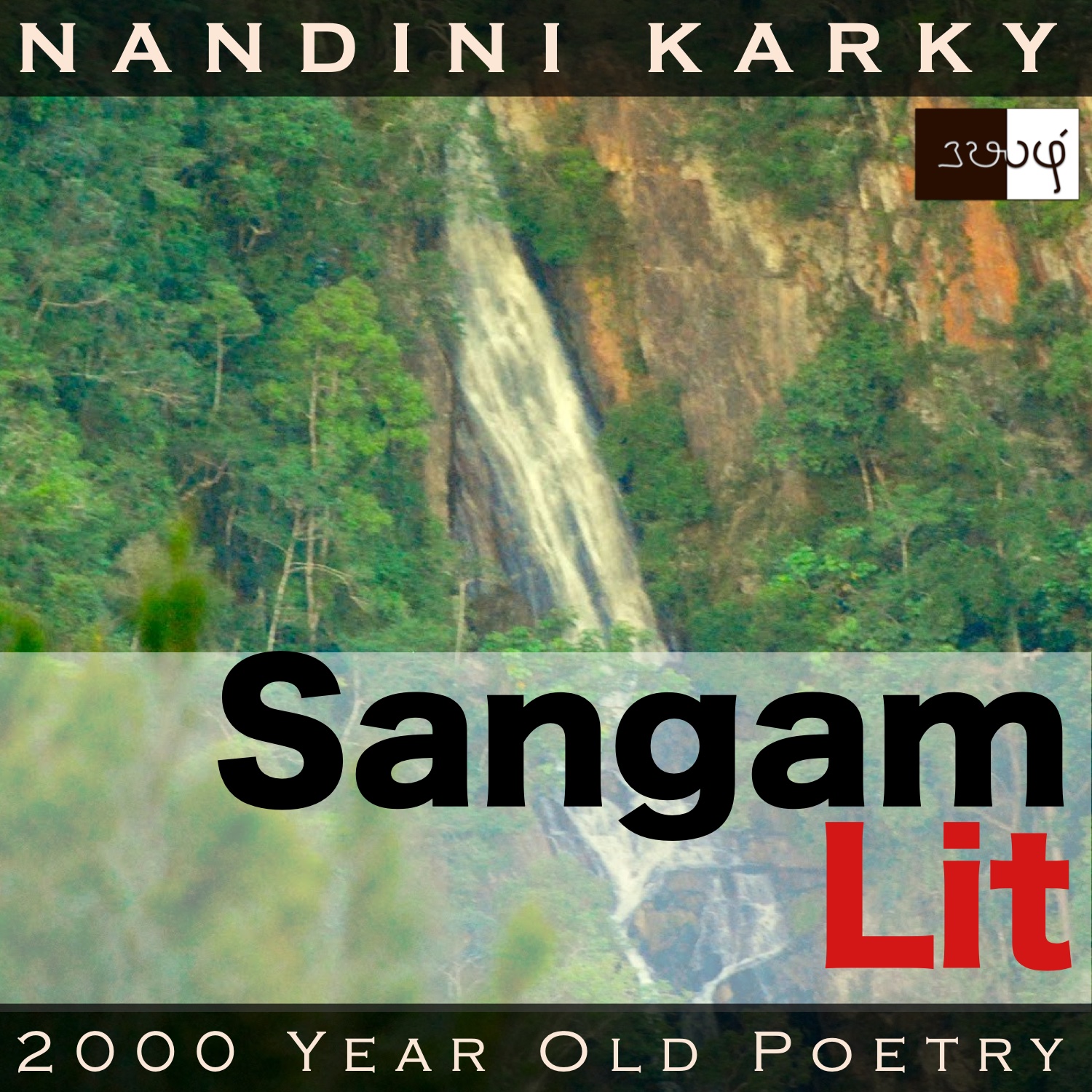Podcast: Play in new window | Download
Subscribe: Apple Podcasts | Spotify | Amazon Music | Android | iHeartRadio | TuneIn | RSS | More

In this episode, we look at the spread of the land in a mountain country and see the lady’s emotions there, as portrayed in Sangam Literary work, Kurunthogai 134, penned by Kovengai Perunkathavanaar. The verse is situated in the hills of ‘Kurinji’ and speaks in the voice of the lady to her confidante, expressing her yearning for the man’s return.
அம்ம வாழி-தோழி!-நம்மொடு
பிரிவு இன்று ஆயின் நன்றுமன் தில்ல-
குறும் பொறைத் தடைஇய நெடுந் தாள் வேங்கைப்
பூவுடை அலங்கு சினை புலம்பத் தாக்கிக்
கல் பொருது இரங்கும் கதழ் வீழ் அருவி,
நிலம் கொள் பாம்பின், இழிதரும்
விலங்கு மலை நாடனொடு கலந்த நட்பே.
A waterfall’s path is sketched in this one! The opening words ‘அம்ம வாழி-தோழி’ meaning ‘listen, may you live long, my friend’ illustrate the habit of rendering a blessing to the listener before seeking their attention. A hypothetical thought appears in ‘பிரிவு இன்று ஆயின்’ meaning ‘if there is no separation’ and instructs us that this verse is set on the theme of pining. ‘நெடுந் தாள் வேங்கை’ refers to ‘the thick-trunked Indian Kino tree’, the oft-represented tree with bright yellow flowers, akin to a tiger’s spots. In the phrase ‘பூவுடை அலங்கு சினை புலம்ப’ meaning ‘making the flower-filled dancing branch lonely’, we see how the word ‘புலம்ப’ which means ‘lament’ in contemporary Tamil refers to ‘being lonely’ here. The cause and consequence seem to have merged in the transformation of this word. ‘கதழ் வீழ் அருவி’ introduces the hero of the subject for it means ‘the gushing waterfall’. Ending with the words ‘விலங்கு மலை நாடனொடு கலந்த நட்பே’ meaning ‘the relationship with the man from the mountains’, the verse invites us to explore more.
Rushing cascades and lonely branches wait to open our mind’s eyes. The context reveals that the man and lady had been leading a love relationship when the man left the lady to gather wealth for their wedding. Unable to bear with his parting, the lady languishes and the confidante tries to console her. To the confidante, the lady says, “Listen, my friend, may you live long! Making the flower-decked, swaying branch of the thick-trunked ‘vengai’ tree, rising between the boulders, suffer in loneliness, the fast-flowing, rock-smashing, resounding cascade, akin to a snake that crawls on land, falls down in the mountains of the lord. If there were no separation with him, then the relationship with him would have been good.” With these words, the lady tells her confidante that even though the man’s relationship was to be treasured, it had left her with the angst of parting away from him.
What we saw was a picturesque scene from the mountains – how does this convey the lady’s situation? Let’s listen to her words carefully to understand. She starts with a request to her friend to listen and then moves on to talk about a ‘vengai’ tree that grows in the mountain side. This tree is seen rising tall amidst the small boulders scattered on the slopes. The spotlight turns on a branch of this tree decked with lush yellow flowers, seen dancing in the mountain breeze. That was the happy past of this tree. Just then, the lady points to a speeding waterfall that roars down the mountain and strikes this thick-trunked tree, steals its flowers, leaving the branch bereft of its beauty. Placing a parallel of a snake that crawls on land, the lady describes the motion of this waterfall, as it finds its way to the foothills. As if she has mentioned this spread of land only to describe the man’s country, the lady goes on to conclude that if only the relationship with the man was not interrupted with separation, that would be perfect.
To perceive the nuances in the lady’s thought, we have to delve deeper into the metaphor of the descending waterfall. The ‘vengai’ tree represents the lady and the gushing, speeding waterfall represents the man. Stealing her beauty and leaving her in loneliness, the man had parted away from her. After the initial joy of togetherness, the man had left to his duties of gathering wealth and it is this intermittent separation that brings anguish to her, the lady implies. In the end, the waterfall will reach the plains and bring prosperity to the lands therein and likewise, the lady believes that the man will return to shower riches on her kith and kin and claim her hand. While that may come true in the near future, at the moment, her present sorrow of being parted from him looms prominently in her mind. Yet again, the question arises as to why so much importance was given in Sangam literature to emotions that surface in separation. Have so many other concerns grown in our modern lives that this pain of separation pales in comparison? And the reverse question – Did the ancients lead such lives of calm and prosperity that their most important concern was only the separation with a beloved? Let’s hold these questions without seeking instant answers and let time reveal what it will!




Share your thoughts...